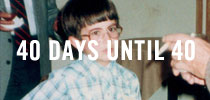
My third week (really?) of jury duty began today, and after a few long runs this weekend, my legs were pretty tired on the bike ride to Santa Monica, but it’s probably good for me, or something. I rode down Main Street and to the beach to read at lunch. It’s amazing how different the place is during the middle of a weekday, a time I’m never usually there.
Land of Black Gold is a Middle Eastern political thriller with slapstick, always a good combination. The book was written in the 1940s, but was extensively redrawn in 1972 to replace the outdated British-run Palestine with a more current, though fictitious, Arab nation, Khemed. The setting provides lots of opportunities for puns in character and place names, such as “El Esdi,” “Bir Kegg,” and “Hasch Abaibabi.” Needless to say, we probably didn’t pick up on those when we were kids.
Tintin is usually pretty honest about who he is, or is quickly recognized as the world-famous reporter, but in this book, he has two aliases: first, he’s Sparky, the new radio operator on the “Speedol Star,” and then, in disguise, he enters Müller’s hideout as Alvaro, Senor Oliveira’s “nephew.” Both Müller and Oliveira are characters from previous stories, and each warrants a footnote in the book, pointing us to the previous book to learn about their first appearances. Another returning character, Bianca Castafiore, isn’t mentioned, but we do see one quick panel of her singing as Tintin tunes across the radio spectrum and comes across her singing.
Some other things of note:
Early on in the book, Snowy suggests they should retire from their adventures.
We get more interesting Britishisms, including this phrase: “If someone’s snooping, he’s had his chips.”
The illustrations in this book feature lots of extra-frame activity: speech bubbles, the splash of water, a thug’s outstretched hand and so on, all extending outside the frame of the panel.
When he grabs a gun, Tintin says “I can’t say I like these toys, but this time I’d better be armed.” He’s been armed in nearly every previous book, so it’s interesting to see him making this sort of remark at this point.
The book finishes with an escape aided by Captain Haddock, who has been absent for the entire story and reappears without explanation; he wasn’t present when the story was first written, but was introduced into the re-drawn version, as he had become an essential part of the series by then. Abdullah, the bratty prince who gets kidnapped in the story, may well be one of the worst villains in the series. He’s not technically a villain, but he makes himself a total pain, especially to those who are trying to help him.





















